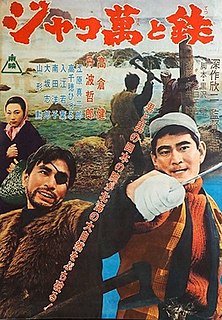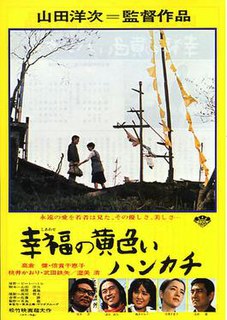 W
WAbashiri Prison aka A Man from Abashiri Prison is a 1965 Japanese film directed by Teruo Ishii and starring Ken Takakura. It is the first entry in the Abashiri Bangaichi / Abashiri Prison series. Highly successful, it was the first hit in the yakuza film genre. It made a star of Takakura and Ishii directed ten more films in the series.
 W
WAffair in the Snow is a 1968 Japanese drama film directed by Yoshishige Yoshida.
 W
WAitsu ni Koishite is a 1987 Japanese drama film directed by Taku Shinjō, based on the 1985 novel Uma no Gonta no Se ni Yurare Yatta ze! Nihonjūdan 2600-Kilo by Yasuhisa Shimazaki. The film is notable for the acting debut of teen singer Chisato Moritaka. Aitsu ni Koishite was released theatrically on May 30, 1987 as part of Pocari Sweat's Movie Caravan campaign.
 W
WBig Joys, Small Sorrows is a 1986 Japanese film directed by Keisuke Kinoshita, revisiting his melancholic earlier work, Times of Joy and Sorrow (1957), of a lighthouse keeper and the transient lifestyle he and his family endure. Shot at 10 different lighthouses, four temples, and various scenic locations, spanning the length of Japan from Kyushu to Hokkaido, the film serves a secondary purpose as an insightful time capsule travelogue of early 1980s Japan.
 W
WBread of Happiness is a 2012 Japanese drama film directed by Yukiko Mishima and starring Tomoyo Harada, Yo Oizumi and Kanna Mori.
 W
WThe Bullet Train is a 1975 Japanese disaster film directed by Junya Satō and starring Ken Takakura, Sonny Chiba, and Ken Utsui. When a Shinkansen is threatened with a bomb that will explode automatically if it slows below 80 km/h unless a ransom is paid, police race to find the bombers and to learn how to defuse the bomb.
 W
WA Chaos of Flowers , also known as The Rage of Love, is a 1988 Japanese film directed by Kinji Fukasaku. The film portrays the movements of society and art in the Taishō period from the viewpoint of Akiko Yosano.
 W
WContact is a 1997 American science fiction drama film directed by Robert Zemeckis, based on the 1985 novel by Carl Sagan. Sagan and his wife Ann Druyan wrote the story outline for the film. It stars Jodie Foster as Dr. Eleanor "Ellie" Arroway, a SETI scientist who finds evidence of extraterrestrial life and is chosen to make first contact. The film also stars Matthew McConaughey, James Woods, Tom Skerritt, William Fichtner, John Hurt, Angela Bassett, Rob Lowe, Jake Busey, and David Morse. The film features the Very Large Array in New Mexico, the Arecibo Observatory in Puerto Rico, the Mir space station, and the Space Coast surrounding Cape Canaveral.
 W
WDrive My Car is a 2021 Japanese road drama film co-written and directed by Ryusuke Hamaguchi. It is primarily based on Haruki Murakami's short story of the same name from his 2014 short story collection Men Without Women while taking inspiration from other stories in it. The film follows Yūsuke Kafuku as he directs a production of Uncle Vanya and grapples with the death of his wife Oto.
 W
WBoku Dake ga Inai Machi , localized as Erased, is a 2016 Japanese thriller fantasy mystery film adaptation of the manga series of the same name featuring Tatsuya Fujiwara as Satoru Fujinuma. It premiered in cinemas throughout Japan on March 19, 2016. The theme song is "Hear ~Shinjiaeta Akashi~" by Chise Kanna. The trailer was released on January 14, 2016.
 W
WGamera, the Giant Monster is a 1965 Japanese kaiju film directed by Noriaki Yuasa, with special effects by Yonesaburo Tsukiji. Produced and distributed by Daiei Film, it is the first film in the Gamera franchise. The film stars Eiji Funakoshi, Harumi Kiritachi, and Junichiro Yamashita. In the film, authorities deal with the attacks of Gamera, a giant prehistoric turtle unleashed in the Arctic by an atomic bomb.
 W
WThe Idiot is a 1951 Japanese film directed by Akira Kurosawa. It is based on the 1869 novel The Idiot by Fyodor Dostoevsky. The original 265-minute version of the film, faithful to the novel, has been lost for many years. A nearly three-hour release, reflecting a 100-minute studio-imposed cut, survives as the most complete version of the film available for contemporary audiences.
 W
WIf You Are the One is a 2008 Chinese romantic comedy film directed by Feng Xiaogang and starring Ge You and Shu Qi. The film has been very successful at the Chinese box office, and has become one of Feng's top grossing films to date, earning over ¥364 million at the box office.
 W
WJakoman and Tetsu , also known as One-Eyed Captain and Tetsu is a 1964 Japanese film directed by Kinji Fukasaku based on an earlier screenplay by Akira Kurosawa and Senkichi Taniguchi that was based on the novel Nishin gyogyo by Keizo Kajino. The screenplay had previously been filmed by director Senkichi Taniguchi in 1949.
 W
WKimi yo Fundo no Kawa o Watare , known as Manhunt, or Hot Pursuit, or Dangerous Chase in some translations, is a 1976 Japanese chase film directed by Junya Satō. It is based on the novel of the same name by Juko Nishimura.
 W
WThe Light Shines Only There is a 2014 Japanese drama film directed by Mipo O. It was selected as the Japanese entry for the Best Foreign Language Film at the 87th Academy Awards, but was not nominated.
 W
WMan Walking on Snow is a 2001 Japanese drama film directed by Masahiro Kobayashi. It was screened in the Un Certain Regard section at the 2001 Cannes Film Festival.
 W
WOne Day is a 2016 Thai romance drama film directed by Banjong Pisanthanakun, and starring Chantavit Dhanasevi and Nittha Jirayungyurn. It tells the story of a man who risks everything to be with his dream girl for just one day by pretending to be her boyfriend after she suffers temporary memory loss.
 W
WThe Place Promised in Our Early Days is a 2004 Japanese anime film written, directed, produced, cinematographed, edited, and storyboarded by Makoto Shinkai in his feature film debut. Set over several years in an alternate history where the Soviet Union occupies half of Japan, the film follows two childhood friends who grow apart after one of their friends disappears; as international tension rises and a mysterious tower built by the Union starts replacing matter around it with matter from other universes, they cross paths once again and realize their missing friend might be the key to save the world.
 W
WPoppoya is a 1999 Japanese film directed by Yasuo Furuhata. It was Japan's submission to the 72nd Academy Awards for the Academy Award for Best Foreign Language Film, but was not accepted as a nominee. It was chosen as Best Film at the Japan Academy Prize ceremony. The film was the third-highest-grossing film of the year in Japan.
 W
WRebirth of Mothra is a 1996 Japanese kaiju film directed by Okihiro Yoneda and written by Masumi Suetani. Produced and distributed by Toho Studios, the film serves as a reboot for the fictional giant monster character Mothra, and is the first installment in the Rebirth of Mothra trilogy. It was the final kaiju film produced under the supervision of Tomoyuki Tanaka, who produced such films as the original Mothra, which was released in 1961, as well as every film in the Godzilla franchise up to this point. He died of a stroke several months after the film's release.
 W
WRun for Love is a 2016 Chinese romance anthology film directed by Zhang Yibai, Guan Hu, Zhang Meng, Teng Huatao, and Gao Qunshu, featuring five love stories respectively in Japan, United States, Norway, Turkey and Saipan. It was released in China on February 14, 2016.
 W
WStation is a 1981 Japanese film directed by Yasuo Furuhata. Among many awards, it was chosen as Best Film at the Japan Academy Prize ceremony.
 W
WTimes of Joy and Sorrow, The Lighthouse, or 喜びも悲しみも幾歳月 , is a 1957 color Japanese film directed by Keisuke Kinoshita, who shot on location at 10 different lighthouses throughout Japan, including opening scenes at Kannonzaki, the site of the country's first lighthouse.
 W
WTora-san Goes North aka Torasan, Remind Shiretoke is a 1987 Japanese comedy film directed by Yoji Yamada. It stars Kiyoshi Atsumi as Torajirō Kuruma (Tora-san), Keiko Takeshita as the film's "Madonna", and Toshiro Mifune as Takeshita's father. Tora-san Goes North is the thirty-eighth entry in the popular, long-running Otoko wa Tsurai yo series.
 W
WThe Triple Cross is a 1992 Japanese film directed by Kinji Fukasaku.
 W
WUnforgiven is a 2013 Japanese jidaigeki Western film written and directed by Lee Sang-il. It is a remake of Clint Eastwood's 1992 western Unforgiven, written by David Peoples. The film was screened in the Special Presentation section at the 2013 Toronto International Film Festival. The film also made its US debut as the opening film for LA EigaFest 2013. It was also presented in 2014 in the Palm Springs International Film Festival and out of competition in the 70th Venice International Film Festival.
 W
WWhen Marnie Was There is a 2014 Japanese anime psychological drama film written and directed by Hiromasa Yonebayashi, produced by Studio Ghibli for Nippon Television Network, Dentsu, Hakuhodo DYMP, Walt Disney Japan, Mitsubishi, Toho and KDDI and distributed by Toho. It is based on Joan G. Robinson's 1967 novel of the same name.
 W
WThe Yellow Handkerchief is a 1977 Japanese film directed by Yoji Yamada. It was the winner of the first Best Picture award at the Japan Academy Prize. The film was inspired by the American song "Tie a Yellow Ribbon Round the Ole Oak Tree," itself based on a column series written by journalist Pete Hamill for the New York Post in 1971.